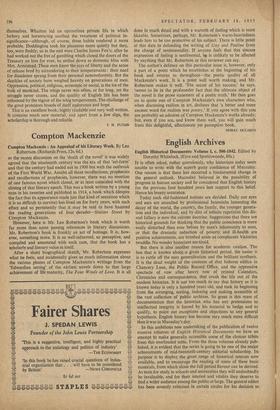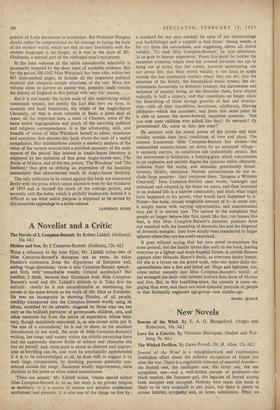English Archives
IT is often asked, rather querulously, why historians today seem unable to write with the superb gusty confidence of Macaulay. One reason is that there has occurred a fundamental change in the general outlook. Macaulay believed in the possibility of progress in human society and he considered that English history for the previous four hundred years lent support to this belief. Hence his breezy assurance.
Today such old-fashioned notions are derided. Daily our eyes and ears are assaulted by professional Jeremiahs lamenting the decay of the world, the country, the family, the younger genera- tion and the individual, and by dint of infinite repetition this dis- mal fallacy is now the current doctrine. Suggestions that there are historical grounds for thinking that the public conscience is more easily disturbed than ever before by man's inhumanity to man, or that the dramatic reduction of poverty and ill-health are positive achievements, arc brushed aside as complacent Victorian twaddle. No wonder historians are timid.
But there is also another reason for academic caution. The less that is known about a given historical period, the easier it is to rattle off the easy generalisation and the brilliant synthesis. It is the dead weight of the contents of that hideous edifice in Chancery Lane, the Public Record Office, and the oppressive spectacle of row after heavy row of printed Calendars, Chronicles and correspondence, that crush the life out of the modern historian. It is not too much to say that history as it is known today is only a hundred years old, and took its beginning from the arranging, sorting, indexing and making accessible of the vast collection of public archives. So great is this mass of documentation that the historian who has any pretensions to intellectual integrity is forced by his material to hedge and to qualify, to point out exceptions and objections to any general hypothesis. English history has become very much more difficult than it was in Macaulay's day. publish all Latin documents in translation. But Professor Douglas should rather be congratulated on his courage in facing the facts of the modern world, which are that an easy familiarity with the ancient languages is no longer, as it was in the days of Mr. Gladstone, a normal part of the cultivated man's equipment.
In the later volumes of the series considerable selectivity is necessarily imposed by the sheer mass of available evidence. But for the period 500-1042 Miss Whitelock has been able, within her 867 close-packed pages, to include all the important political material and adequate sample selections of the rest. Were this volume alone to survive an atomic• war, posterity could rewrite the history of England in this period with very fair success.
But it is not merely the lavish scale of this undertaking which commands respect, not merely the fact that here we have, in accurate and lucid translation, the whole of the Anglo-Saxon Chronicle, all that is most valuable in Bede, a good deal of Asser, all the important laws, a mass of Charters, some of the more useful hagiographies and much of the surviving political and religious correspondence. It is the scholarship, skill, and breadth of vision of Miss Whitelock herself as editor, translator and annotator that elevates this book above the rank of a useful compilation. Her introductions contain a masterly analysis of the value of the various sources and a polished summary of the main aspects of the period. Her interest in Anglo-Saxon literature is displayed by her inclusion of that great Anglo-Saxon epic, The Battle of Maldon, and of the two poems, 'The Wanderer' and 'The Seafarer,' that give so striking an impression of the haunting melancholy that characterised much of Anglo-Saxon thinking.
The only criticisms to be raised against this book are concerned firstly with the price, which seems excessive even by the standards of 1955 and is beyond the reach of the average pocket, and secondly with the index, which is pitifully inadequate. Indeed it is difficult to see what useful purpose is supposed to be served by this miserable appendage to a noble volume. •
LAWRENCE STONE











































 Previous page
Previous page